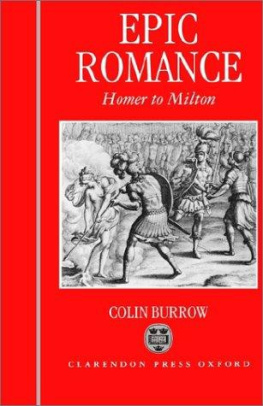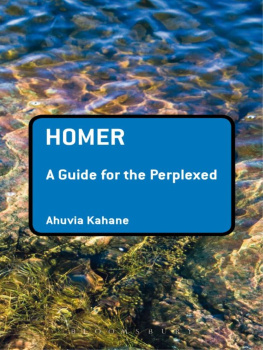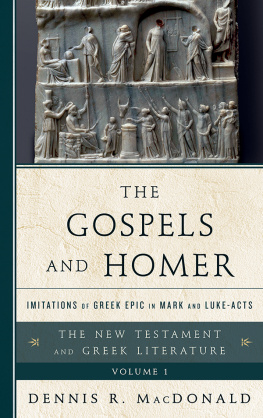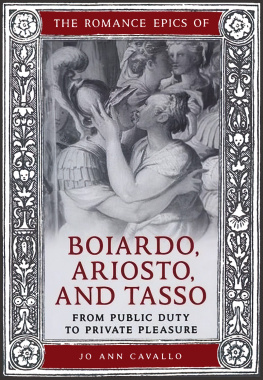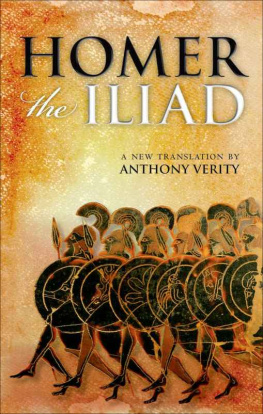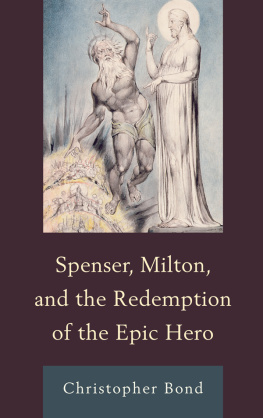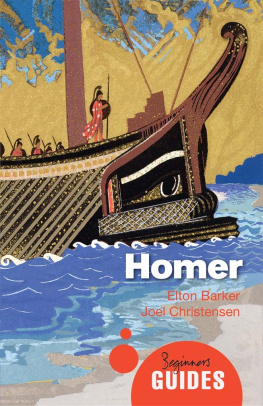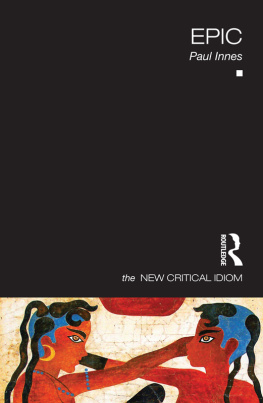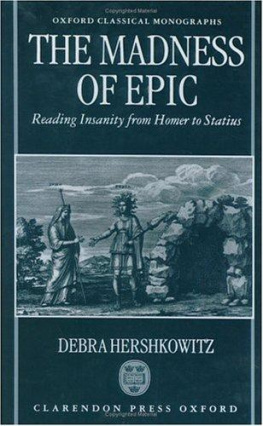This book relates the whole tradition of epic romance back to Homer's poems Iliad and Odyssey. The core notion of this book is that both poems present a structure of emotion that is extremely hard to grasp; that they are both with differing emphases, certainly, and with different priorities of representationconcerned with the nature of sympathy, and its relation to complex social rituals such as guest-friendship and supplication. Homeric pity has a multiplicity of aspects; at one moment a character pities another because of some perceived analogy between his or her condition and that of the sufferer, while at another, pity arises from a sense that there is a contingent affinity between two characters, that the pitiers know that they could be like the pitied at some future time, or that both parties share their subjection to death.
Keywords: epic, romance, poems, Iliad, Odyssey, nature, sympathy, pity, Homer
Epic, in popular usage, tends these days to mean vast. It may also be used to suggest that readers will find much to endure in the works so described (with sometimes, as in a recent advertisement, Buying a Used Car Need not be an Epic Experience, a suggestion that the whole protracted business is likely to end in a swindle). Even in its literary applications the word often seems unattractive. Most people would regard epic as a unified and purposive mode of writing, which grows from, and celebrates, the values of a society simple enough to regard some people as heroes. This view is an offshoot of a very pervasive critical mythology which has grown up around the epic form, a mythology which has its roots in a bizarre mixture of composts. Neoclassical literary theory has, since at least the mid-sixteenth century, celebrated epic as a form unified by plot, by canons of decorum, and by subject-matter. And since at least the middle of the last century those influenced by romantic aesthetics have praised the epic as a manifestation of the primal, unsophisticated values of the heroic societies which are supposed to be able to produce distinctively epic works. evokes long-dead meat still twitching with the spasms of life. Not all readers would put their dislike so colourfully; but for most epic connotes everything which they would not be predisposed to like: eulogy, heroism, unity, dull officialdom, maleness.
Several critics have, in recent years, attempted to improve the image of the genre through reappraisals of its chief exemplars. It has been argued with a predictable frequency over the past half-century that the These developments make the epic form seem less grimly purposive than it appears to be for earlier critics; but these new approaches are still parasitic on earlier traditions. Critics in the further voices school would confess (some, perhaps, under protest) that the central voice in the Aeneid is still a public one, of duty, sacrifice, heroism; its other elements are other indeed, the odd minor and regretful squeak from the piccolos of selfhood, which try vainly to make themselves heard over the bass drums, the full strings, and strident brass of a driving heroic melody.
These lines of criticism have led to the current impression that romance is something very different from epic. Romance is now often stressed on the first syllable, and is often used to mean Barbara Cartland. Romance, outside the rarefied atmosphere of Northrop Frye's works, means sex, travel, social aspiration, swooning heroines, rakish heroes, a touch of class, a trace of scandal, and, above all, wish-fulfilment. It has become a term which is antithetical to epic. The creation of this antithesis goes back a long way, and is intricately entangled in the reception history of epic. It derives ultimately from a determination to see the two Homeric poems as rootedly distinct from each other: the Iliad shows fighting, and heroic goings-on, so it is epic; the Odyssey relates wanderings, magical adventures abroad, and a final comic reunion in the return of the hero to his wife and home, so it is a romance. The roving and amorous heroes of the Greek prose romances of Heliodorus and Achilles Tatius (among others) helped to heighten the distinction between the loving vagrancy of the Odyssey and the fierce wars of the Iliad. His book creates the impression that there is something wrong with calling a book Epic Romance, that there might even be something scandalous in suggesting that epic and romance might interpenetrate, coalesce, or even be facets of the same texts.
I have struggled in this book to think myself outside these traditionally established antitheses, and to formulate an alternative way of looking at the tradition of epic poems deriving from Homer. I have remained trapped to a degree by the polarity of the two main terms of my title, partly (although not, I fear, only) because many of the writers I discuss were involved in one way or another with manufacturing or exploiting the opposition of the two modes. I sometimes oppose epic austerity and purpose to romance vagrancy and pity, when this reflects what the writers under discussion appear to think. But I have always tried to bear in mind that epos originally means word, song, story: it originally encompasses all forms of discourse. And it is with this vastness in mind, and with a conviction that epic emanates a multiplicity of blended voices to the future, that I relate the whole tradition of epic romance back to the Homeric poemsboth of them. The core notion of this book is that the Iliad and the Odyssey present a structure of emotion which is extremely hard to grasp; that they are bothwith differing emphases, certainly, and with different priorities of representationconcerned with the nature of sympathy, and its relation to complex social rituals such as guest-friendship and supplication. Homeric pity has a multiplicity of aspects; at one moment a character pities another because of some perceived analogy between his or her condition and that of the sufferer, while at another, pity arises from a sense that there is a contingent affinity between two characters, that the pitiers know that they could be like the pitied at some future time, or that both parties share their subjection to death. There are also extraordinary moments in the Iliad when pity becomes a (p.4) motive for fighting, and generates a ruthless sense (as it were) that all people live under death, and that one should consequently do nothing to help a sufferer. This complex body of concerns (it is nothing so simple as a single passion or a unified emotion) has preoccupied many classicists over the past twenty or so years, and I have drawn heavily, though no doubt at times inaccurately, on their work. This complex attitude, however, lies ultimately behind the whole line of epic romance described here. Writers in this tradition struggle repeatedly to comprehend this many-sided experience.
Most do so through the medium of Virgil, who shows a repeated tendency to oppose something like pity to something like imperial duty; but he also attempts, through the ambiguous and multi-valent term pietas, to replicate something of the range of experience related in the Homeric poems. Sixteenth-century writers in the vernacular approach Virgil through a web of Christian values, and through a significant manifestation of those values: the widespread European tendency for

